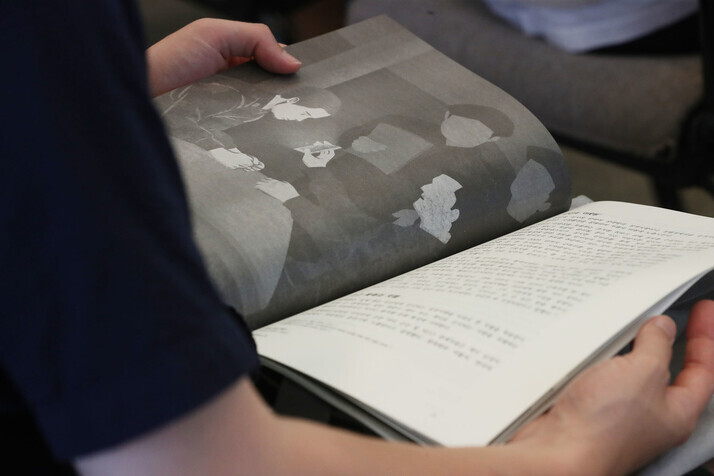hankyoreh
Links to other country sites 다른 나라 사이트 링크
[Exclusive] New Defense Ministry proposal would force Korean trans women into military service

South Korea’s Ministry of National Defense wants to relax the physical assessment standards for mandatory military service to force transgender women to perform service. The move faces major criticism given concerns that trans women could face human rights abuses in the Korean military, which is notorious for a culture of homophobia and transphobia.
The changes appear in a draft revision for the rules for physical examinations judging whether men are capable of performing their mandatory military service. The ministry gave advance notice of the draft revision on Dec. 13.
Under a new rule in the draft revision, trans women who have not been regularly taking hormone therapy for at least six months would be classified as Grade 4, which would mean they have to join the military as social service personnel, an alternative form of military service. If the proposed rule is adopted in its current form, trans women who have not met the six-month mark for hormone therapy would have to join the military reserves after completing their time as a social service agent.
This addition to the standards for Grade 4 classification makes it more likely that trans women will have to serve in the military. Currently, transgender women who have completed at least six months of hormone therapy are classified as Grade 5, which exempts them from service. But even those who have not completed six months of hormone treatment may still be classified as Grade 7 (re-assessment) if they need more time for observation.
An official with the Defense Ministry noted that regular complaints were coming in from people experiencing gender dysphoria about the fact that they have to keep coming back in for more physical examinations until they receive at least six months of hormone therapy.
“We concluded that as long as they’re not experiencing gender dysphoria to a serious degree, they ought to be able to handle alternative service,” the official said, explaining the reasons for the proposed revision to the rules.
LGBTQ rights groups criticized the government’s plan as being “discriminatory and showing a lack of understanding about transgender people in the sense that it reduces gender identity issues to a question of surgery and therapy.”
“Trans people feel differently about how long to take hormone therapy or whether they should take it at all, as well as about the need for [gender-affirming] surgery. That all depends on the severity of their gender dysphoria and the environmental conditions [surrounding that]. The government ought to totally retract this draft revision, which completely disregards how transgender people suffer in a society that takes the gender binary for granted,” said Kim Yong-min, an activist with Solidarity for LGBT Human Rights of Korea.
Significantly, experts are concerned that transgender women who are forced into military service will face discrimination and bigotry inside the military.
“Some transgender women who have gone to reserve training have been bullied by men who have recognized them as transgender and posted pictures of them on online communities,” said Park Han-hee, an attorney with Korean Lawyers for Public Interest and Human Rights.
According to a 2020 report about the current state of transphobia and discrimination faced by trans people in the country published the National Human Rights Commission of Korea, 84.8% of Korean trans women who served in the military said they’d heard disparaging language about LGBTQ people in the military or struggled to use group showers.
Moreover, nearly half of respondents (47.4%) said that they had been categorized as “maladjusted” or subjected to violence, including but not limited to sexual harassment.
The Ministry of National Defense will be taking public opinion on their proposed changes through Monday.
By Oh Se-jin, staff reporter
Please direct questions or comments to [english@hani.co.kr]

Editorial・opinion
![[Editorial] Korea must respond firmly to Japan’s attempt to usurp Line [Editorial] Korea must respond firmly to Japan’s attempt to usurp Line](https://flexible.img.hani.co.kr/flexible/normal/500/300/imgdb/original/2024/0514/2317156736305813.jpg) [Editorial] Korea must respond firmly to Japan’s attempt to usurp Line
[Editorial] Korea must respond firmly to Japan’s attempt to usurp Line![[Editorial] Transfers of prosecutors investigating Korea’s first lady send chilling message [Editorial] Transfers of prosecutors investigating Korea’s first lady send chilling message](https://flexible.img.hani.co.kr/flexible/normal/500/300/imgdb/original/2024/0514/7917156741888668.jpg) [Editorial] Transfers of prosecutors investigating Korea’s first lady send chilling message
[Editorial] Transfers of prosecutors investigating Korea’s first lady send chilling message- [Column] Will Seoul’s ties with Moscow really recover on their own?
- [Column] Samsung’s ‘lost decade’ and Lee Jae-yong’s mismatched chopsticks
- [Correspondent’s column] The real reason the US is worried about Chinese ‘overcapacity’
- [Editorial] Yoon’s gesture at communication only highlights his reluctance to change
- [Editorial] Perilous stakes of Trump’s rhetoric around US troop pullout from Korea
- [Guest essay] Preventing Korean Peninsula from becoming front line of new cold war
- [Column] The state is back — but is it in business?
- [Column] Life on our Trisolaris
Most viewed articles
- 1Korea cedes No. 1 spot in overall shipbuilding competitiveness to China
- 2Korean opposition decries Line affair as price of Yoon’s ‘degrading’ diplomacy toward Japan
- 3[Column] Will Seoul’s ties with Moscow really recover on their own?
- 4US has always pulled troops from Korea unilaterally — is Yoon prepared for it to happen again?
- 5[Editorial] Transfers of prosecutors investigating Korea’s first lady send chilling message
- 6Major personnel shuffle reassigns prosecutors leading investigations into Korea’s first lady
- 7[Editorial] Korea must respond firmly to Japan’s attempt to usurp Line
- 8[Photo] Korean students protest US complicity in Israel’s war outside US Embassy
- 9Naver’s union calls for action from government over possible Japanese buyout of Line
- 10Korean auto industry on edge after US hints at ban on Chinese tech in connected cars